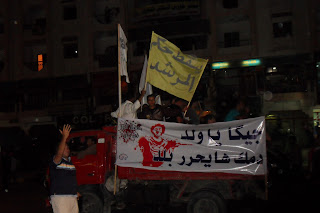Last
Friday, the opposition has called for another protest and people followed this
call all over Egypt.
I joined
the protest in Hurghada again. The activists added a small red lorry to lead
the protest. On top of it they fixed loud speakers and two or three men rotated
in transmitting the chants. Flags, banners, posters and papers with slogans
were handed out.
Some
people observe me suspiciously. When my Arabic teacher S. arrives, I forget
about it. M., one of my students is here and another foreigner joins. I’m not
the only one anymore! I., another activist, remembers me and shakes hands with
me.
The
group starts: ahead is the lorry, then some men carrying big banners and the
Egyptian flag, behind them we the women and at the end the men.
Women of
all age walk next to me, in front of me and behind me, chanting
full-throatedly. They hold up banners or flags, raise their fists in the rhythm
of the chants. People step on my feet, push me from the back, from right and
left. An Egyptian lady links arms with me and tells me that she knows that I am
S.’s friend. This is my legitimation, I’m accepted.
It’s hot,
much too hot for this time of the year and there is absolutely no wind. Most
people are dressed according to the season – not according to the temperature –
that means, much too warm. The respective odours linger in the air and mingle
with the exhaust fumes of the small lorry.
Me too,
I also step on other’s feet, smile, apologize, try to find a gap in order to avoid
it. Yet now, a flag is waving around my head und I can’t see anything. Now and
then, the march stops and I look back to take pictures. I discover another
friend of mine and greet him.
Men make
again a human chain around the protest march. I walk at the side to have more
fresh air and freedom of leg movement. But I. appears and shouts “goa” – inside.
Inside, in the middle of the group. I raise my eyes to the frontages: there are
much more people on the balconies, they applaud and join the chants against
Moursi, the constitutional declaration, the constitution and also against the
Muslim Brothers. A companion shouts into my ear „dustour diktatoria“ – dictatorial
constitution.
I leave
the group for a moment to take pictures from the edge of the street. The group
is somewhat bigger than on Tuesday. Someone on the side-walk is mumbling what this
foreigner has got to do there. This affects me a bit, but this is typically
Egyptian. I return to the group. Now, men hold a rope around the group.
I walk deep
in thought amidst the group to Sekalla. I do this to support Egyptians and not
to interfere. I do this because I know what all is about and how difficult it
will be for Egypt. Last week, I wrote “continuation of the 25 January 2011”,
even before I knew how Egypt would react on Moursi’s decree. Meanwhile, the
draft constitution, hastily assembled mainly by Islamists, was voted over and a
date for the referendum is scheduled. Judges are on strike, protests continue,
UNO and EU put pressure. Intellectuals, politicians, ex-presidential candidates
and activists fight united against an imminent dictatorship which would
restrict the people’s lives even more.
My feet
hurt from the many blisters from last time, my legs from the hours-long march.
I compare with Western Europe: democracy, state of law, legal security,
separation of powers, and compliance with human rights… We all have this and it
is taken for granted. We make use of it without being aware what it really
means. They also had to be fought for and achieved. Even today, they have to be
observed and preserved carefully.
And here
in this third-world-country that is mainly known as a sunny destination for
diving and beach holidays as well as for its unique historical treasures? Where
tourists relax from their hard labour in gorgeous hotel resorts? There is
nothing, absolutely nothing. But people know what they want and they are ready
to fight for it. This is why they take to the streets. This is why the iconic
Tahrir square is once more filled with hundreds of thousands of protesters.
They will not give up before having reached their goal.
Someone
beside me calls my name. It’s my friend B. who walks on my right and is part of
the human chain. I’m glad to see him and we talk a while. We’ve arrived in
Sekalla and on both sides of the street people stand side by side. It was like
this all the way – unlike Tuesday.
The
march turns at Arouse square and I leave the group, say farewell to my acquaintances.
I remember
as how one of my students had to form a sentence with the German verb “möchten”
(to want): “Wir möchten Demokratie” (we want democracy). I wish that my
students soon will be able to form a sentence with “haben” (to have).





No comments:
Post a Comment
Thanks for your comment. I very much appreciate your active participation. Freedom of opinion is guaranteed. However, I reserve myself the right to delete impertinent and insulting comments.